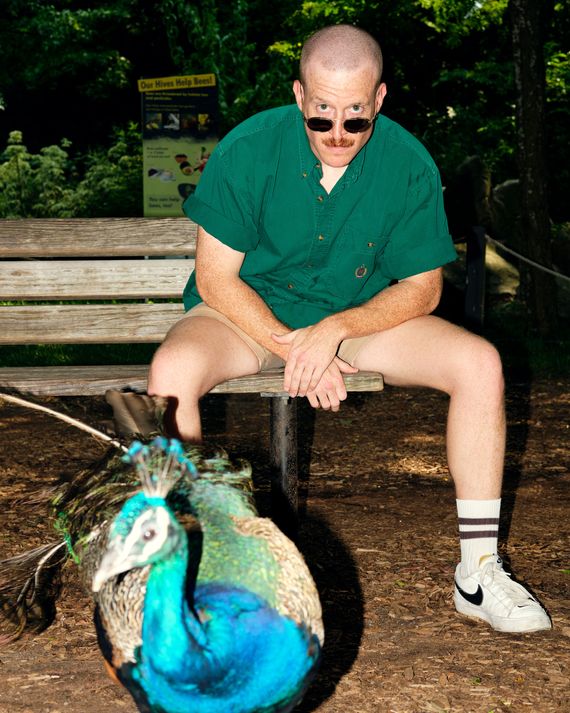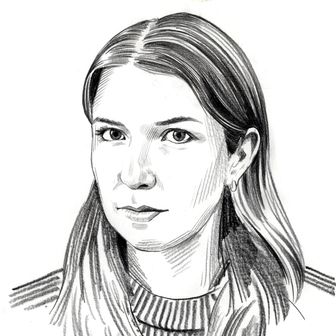
This article was featured in One Great Story, New York’s reading recommendation newsletter. Sign up here to get it nightly.
Andrew Lipstein and I meet at the Prospect Park Zoo on a Monday just after a bank of wildfire smoke has cleared the city. The sky is a dim gray, and the air is thick with humidity. Both the people and the animals seem exhausted. A sea lion swims a slow loop underwater as a zoo attendant hoses down its pool. The peacocks are screaming. The Hamadryas baboons, whose faces look like they’ve been pinched at the nose, sprawl on a rocky outcrop. Looking at them through the glass, Lipstein says, “These guys always seem so deranged and sad. They don’t even know they’re crazy.”
It’s in the spirit of Lipstein’s second novel, The Vegan, to bear witness to the apparent unhappiness of the creatures who bump up against the human world. The book follows a New York finance guy named Herschel Caine who feels a sudden, almost psychedelic kinship with animals — his neighbor’s beagle, for instance, but also a housefly and a pigeon that has what he decides is “the fleeting, easy beauty of youth.” Herschel’s sudden concern with nonhuman inner lives comes after a freak accident involving a dose of ZzzQuil he sneaks into a cocktail for an annoying dinner guest who, he later learns, falls on her way home and enters into a coma. Shaken, Herschel tells no one what he did, instead attempting to right his moral balance sheet through a series of increasingly ridiculous equations, including becoming a vegan. At one point, to satisfy his animal fixation, he breaks into the Prospect Park Zoo to commune with the inmates. All this while running a quantitative hedge fund that may be guilty of a much broader form of misconduct.
The novel sets a series of dead-serious moral traps for its protagonist to trip into but is also very funny, and Lipstein’s writing voice is sleek and constrained. On his way to what may be enlightenment, Herschel bluffs through teletherapy, sends cranky business-speak emails to investors, and lugs around a tank containing two cherished anoles he picked up at a pet store. “A lot of books about money take for granted the evilness of it,” Lipstein says. “I love starting with the hedge-fund guy and examining his goodness. We take it for granted that we’re supposed to hate him.” When I point out that Herschel does bad things in the novel, he asks what I mean, seeming defensive on his character’s behalf.
Lipstein can talk about finance this way in part because he works adjacent to the industry himself — he has what he calls a “mathematical” job for Robinhood, the financial-services company known for its super-accessible stock-trading app, making tools for options investors. He shows up for our interview in sunglasses and a Barron’s cap; his wife, Mette Lützhøft, makes podcasts for that publication. He describes himself as “not a hard-core capitalist, but I believe in a world of good capitalism. Extremely high taxes.”
A few months before starting to write The Vegan, he started trading stocks and says he became fascinated with “how much psychology is in the markets.” The novelistic potential was obvious, as was that for profit. “Not to lack all humility, but I ended up making a lot of money,” he says — the exact amount of his first book advance, in fact. That book was his first novel, Last Resort, a relentlessly clever publishing-world saga about a writer who lifts a salacious story wholesale from an old friend’s life and eventually faces the consequences. He submitted the book to FSG under a pseudonym, betting that editors would be more likely to think he was a big author veiling his identity and take a chance than if he used his real name. It worked. (His U.K. editor thought he might have been the disgraced author Dan Mallory angling for a comeback.) It didn’t shoot onto best-seller lists when it came out last year, but critics loved it — the Washington Post called it a “deliciously absurd comedy.”
Unlike his characters, who tend to be fretful and manipulative, the 35-year-old author, freckled and wide-eyed, is at ease in conversation and quick to banter. When talking to Lipstein, you may start to think the equation is simple: Put in the effort and novels will come out. He thinks of writing in the same category as running, an activity he took up while trying to lose weight as a teenager, which helped him prove to himself that he could “do something very difficult.” He runs the number of miles he wants to run; he writes the number of pages he wants to write. “If I set a word quota for myself, there is nothing that will prevent me from doing it,” he says. “I become psycho with quotas.” The goal is “changing your life by brute force.”
Lipstein didn’t grow up reading. He believes his OCD gave him a lingering feeling that he had missed a word, and as a result, he would go over the same sentence again and again; he struggled to finish books. His undergraduate degree, from Haverford, is in math. He also had a sense of humor and enjoyed the attention it gave him. Eventually, he started writing for, then running, the college satire magazine, and after a senior-year creative-writing class, he quietly finished a novel. “I would listen to him and some of our friends who were math majors talk,” says his classmate Joshua Mikutis, now a rabbi. “It was totally esoteric — math problems that were like ‘If you have a sphere and you want to turn it into a doughnut, how does that happen?’” Lipstein’s writing “seemed like it was out of nowhere,” Mikutis adds. “How many people are hypothetical novelists?”
That first manuscript led to another, then another and another and another. Lipstein insists his first five unpublished novels are “shockingly embarrassing. I don’t think I could read anything I wrote then without losing all of my dignity.” (Publishers weren’t interested either, though parts of his fourth found their way into Last Resort’s book within a book.) Before publishing a novel, he kept up a steady stream of creative projects: a microfiction website named Thickjam, a parody New Yorker called The Neu Jorker he made with the writer James Folta, and an e-book and e-magazine store called 0s&1s that runs author interviews under such categories as “Thick Skin” (in which writers close read their negative reviews) and “The Art of Commerce” (which focuses on the business of making books). He keeps up with new fiction — he’s effusive about Assembly, by Natasha Brown, and Y/N, by Esther Yi — but also loves the academic William Ian Miller’s books about disgust and humiliation; the 1980s Wall Street takeover classic Barbarians at the Gate, by Bryan Burrough and John Helyar; “books about Enron”; and all the finance news he can handle. “I consume a ton of financial media, and I love how real it is,” he says. When you have a number in a headline, he thinks, “it has to be true. A financial headline will be like, ‘This fund made $2.3 trillion last year.’” In cultural media, there may be a payout, but “no one says it.”
Lipstein’s books are rich with numbers and status symbols — the protagonists in Last Resort and The Vegan both experience unexpected influxes of cash and know how much things like Tabriz rugs cost (“$12,000, another $1,000 to ship it back”). In The Vegan, Herschel and his wife try to cultivate a friendship with their cultured Cobble Hill neighbors by serving “escarole with pancetta and hen of the woods, sweet potato and sage ravioli in parmesan broth (the idea shamelessly cribbed from Frankies, an Italian restaurant up the street), and bone-in pork chop saltimbocca (ditto).” The people Lipstein writes about may be interested in trying to do good, but they’re also vain, status-obsessed, and darkly exacting in their assessments of one another’s furniture. Even good acts get tallied up and compared. While writing The Vegan, “I thought a lot about how money and morality are similar,” he says. “Only you know how much money you have; only you know how much morality you have.”
Herschel is the kind of character who’s normally in strict control of his emotional landscape, and his sudden influx of animal empathy strikes him like a bout of nausea. If he could only look an animal in the eye and somehow communicate with it, he supposes, he could gain some understanding of what is happening to him. Lipstein is a vegetarian, and, like Herschel, he stopped eating meat out of a buried sense of grief: Six years ago, his father choked on a piece of steak that cut off his oxygen flow; as a result, he became blind and paralyzed. Lipstein wasn’t at the dinner but says he couldn’t help but feel responsible for what had happened, as though some minor decision he made in his life had led to that moment.
Two years later, while sharing pork dumplings at East Wind Snack Shop with Lützhøft, Lipstein suddenly looked at his plate and told her, “I can’t do this ever again.” The connection wasn’t immediately clear; he realized only later why it felt so viscerally wrong to eat the food on the table. He believes now that there was a subtle connection between his repulsion and the irrational guilt he felt. “My dad chokes on steak, and two years later I become a vegetarian,” he says, beginning to tear up. “It didn’t occur to me that it had anything to do with it, and yet I sensed that the reason why was totally out of my grip.” Lipstein later started writing The Vegan, inspired in part by the unnervingly abrupt, emotionally freighted sense of disgust he had experienced.
Back in Prospect Park with rain threatening, he and I enter the so-called Discovery Trail and make it to the Styan’s red panda, the small zoo’s prized possession. Straddling a tree branch, its tongue lolling, the panda looks “dazed out,” Lipstein says, as though it’s in the middle of an 18-hour workday. (The panda’s brother doesn’t even show up for his shift.) In The Vegan, Herschel is desperate to make contact with this same animal, standing in front of its enclosure and taking off all his clothes. The late-night encounter doesn’t lead to the communication he craves. “There I stood in front of him as he’d never seen a human before,” Herschel thinks proudly — but the red panda is startled and runs away. We leave our clothes on, the red panda stays, and a kid runs over to make what he seems to believe is a panda sound. “Make a noise back,” Lipstein says to the animal. “Come on!”
An earlier version of this story included a quote from The Guardian’s review of Last Resort that was actually about the fictional novel within that book.


